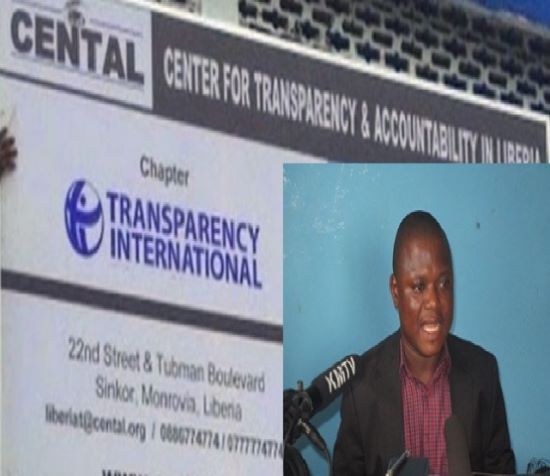Says LACC, GAC, PPCC Must “Lead By Example In Upholding The Culture Of Accountability, Transparency, And Integrity”
PHOTO: CENTAL Executive Director, Anderson D. Miamen
The report also found favoritism in government stating that those suspected of being supporters of opposition parties were not appointed and, in cases where appointed, said appointments were revoked.
Monrovia, Friday, June 21, 2024- In a bid to ensure efforts towards good governance, the fight against corruption, and adherence to the rule of law are enhanced and sustained, the Center for Transparency and Accountability in Liberia (CENTAL) has released a Monitoring Report of President Joseph N. Boakai’s Unity Party-led government earlier days in office.
The report, launched Thursday, June 20, 2024, in Monrovia, is a product of qualitative research and data gathered through a desk review of relevant laws and documents, online research, media monitoring, and interviews with informants.
In a release issued in Monrovia, CENTAL’s Executive Director, Anderson D. Miamen said the report catalogs developments in the anti-corruption space spanning the first 100 days of Joseph N. Boakai’s administration. The report, Executive Director Miamen intimated, represents the second published by CENTAL since 2018 when the first was produced during the regime of former President George M. Weah.
Miamen emphasized that the 2024 monitoring report, amongst many others, analyzes actions, inactions, and allegations with a view of laying bare realities that contrast or support aspirations for a vibrant anti-corruption framework and recommends actions to address the issues identified.
Contained in the report are key findings which include controversy and delays in the nomination of officials by the President, questionable integrity record of some officials appointed, favoritism observed in the selection of officials, gender and inclusion credentials of the government, allegations of corruption in government, actions not matched with anti-corruption commitments made, targets set and results attained by the government, anti-
corruption financing, the recovery of government assets, the rights and civic space, the legislature and recommendations for improvement.
The findings revealed that nominations to most positions took place over three months following the inauguration, and in some cases, were spaced apart by a week and some were not publicized. Of the 1,306 appointments, the report found that 38 were affected by controversies including resignation, withdrawals of appointments, change in appointments, and stalling of appointments affecting tenured positions. Also, some appointees were found to have returned to government with checkered history including the Chairman of the Board of the Liberia Maritime Authority (LIMA), S. Tornorlah Varpilah, who had been designated to restitute public funds by the National Legislature, Daniel Johnson, Secretary General of the Robert Flight Information Region, wanted by the United States government for fraud, Nortu Jappah, the choice to head the National Insurance Company of Liberia who was made to resign his role as Managing Director of the Liberia Water and Sewer Cooperation (LWSC) in 2012 due to corruption.
Others include Patrick Sandike, Deputy Managing Director for Technical Services to the LWSC, who was dismissed for corruption when he served as Operation Engineer at the same institution, Rudolph Merab, Managing Director of the Forestry Development Authority (FDA), reputed to have been involved into illegal logging activities, and Mohammed M. Bah, Special Presidential Envoy for Investment, who is reported to have defrauded Liberians while posing as a dealer of used cars.
The report also found favoritism in government stating that those suspected of being supporters of opposition parties were not appointed and, in cases where appointed, said appointments were revoked. The report says further that 57 percent of those appointed by the President to head public entities hail from the North-Central region of Lofa, Bong, and Nimba. On allegations of corruption that have dodged the Boakai administration, the report cited President Boakai’s request and receipt from NASSCORP, funds to finance the purchase of five Land Cruiser SUVs valued at US$117,000 each, prior to his inauguration. Reports of the President’s nephew and Officer-In-Charge of the National Oil Company of Liberia (NOCAL), Jake Kabakole, disbursement of US$600,000 to contractors under questionable circumstances, Public Works Minister Roland Giddings admitting to violating the procurement law by awarding road maintenance contracts valued US$22.4 million without a competitive bidding process were also highlighted.
Regarding gender, the report noted that some positive strides have been made including appointment of the first female Minister of National Defense and have females constituting 30 percent of the Cabinet. Meanwhile, it was also found that females constitute 18.5 percent of all appointments made by the President. The report further stated that three physically challenged persons were appointed to top roles in government including Samuel S. Dean, Sr., Executive Director of the National Commission on Disabilities, Dr. Luke Bawo, Managing Director of the Liberia Medical and Health Products Regulatory Authority (LMHRA), and Nowa Zawu Gibson, Deputy Managing Director for Operations at the National Transit Authority (NTA).
Highlighted in the recommendations of the report were the need for President Boakai to fully constitute and empower the office of Ombudsman to oversee the implementation of the code of conduct for public officials, the need to ensure that resources budgeted for legislative engagements and projects are properly managed and accounted for, through the required systems and processes of government, the Supreme Court firmly and timely implementing judicial reforms, and ensuring that lingering issues around judicial corruption, malpractices of some lawyers, judges and other judicial officials are independently investigated and prosecuted where necessary.
Other recommendations include the need for the Liberia Anti-Corruption Commission (LACC), the General Auditing Commission (GAC), the Public Procurement and Concession Commission (PPCC), and other core transparency institutions to lead by example in upholding the culture of accountability, transparency, and integrity in line with the code of conduct for public officials and other regulations and policies.

